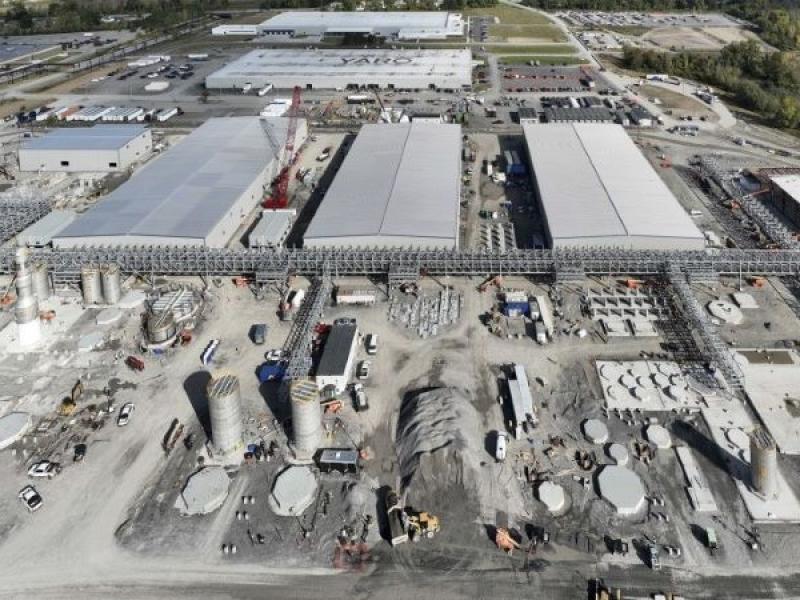
Li-Cycle Holdings Corp. (LICY-N) announced it is exploring financing and strategic alternatives amid a construction funding crunch at its Rochester, N.Y. battery recycling Hub and a $96.5-million impairment charge on its Q3 2023 earnings.
In its Q3 financial results ended Sept. 30, the Toronto-based battery recycler revised its price tag for the Rochester Hub from an original estimate of $560 million to at least $700 million, and possibly $850 million to $1 billion.
The company reported a net loss of $130.5 million in the quarter, compared to $20.6 million in the same period of 2022.
Operating expenses in Q3 2023 were $144.8 million, driven by the $96.5 million non-cash impairment charge of the company’s assets, higher personnel costs, plant facility expenses, and research and development expenses.
Ajay Kochhar, the president and CEO of Li-Cycle, blamed the “convergence of two factors, namely: an escalation in actual construction costs versus prior indicated, and delays in complex financing,” in its earnings call with investors and analysts on Monday, Nov. 13.
The construction delay at its New York Hub — where work was stopped in October due to the rising costs — led to reviews of its four European Spoke facilities and slowed production in North America, pushing back more of Li-Cycle’s ambitions.
Li-Cycle created a patented Spoke and Hub system for its battery materials recycling facilities, with Spoke facilities collecting materials and separating some components, then shipping the materials to Hubs for final processing into products which can be reused for a variety of applications.
Elevated Rochester construction costs
Kochhar elaborated on the specific costs and impediments that affected construction on the Rochester Hub, which is expected to process up to 35,000 tonnes of black mass per year when it is fully operational. He pointed to the rising prices of equipment, structural steel and especially labour.
The capital expenditure estimate for the Rochester Hub rose “substantially higher” from its $560 million price tag, he said, with Li-Cycle having spent $301 million as of Sept. 30, 2023.
Li-Cycle has approximately $100 million in cash on hand as of Nov. 10, compared to $137 million on Sept. 30 and $289 million on June 30.
The company has been engaged with the U.S. Department of Energy (DoE) to finalize a previously announced $375-million conditional loan, but faced a delay from the targeted close from the end of June to September. The loan has still not been secured.
Li-Cycle had also anticipated a refund of a “substantial portion” of the $92 million it put toward the process and warehouse buildings upon completion of a building lease arrangement. But the funding did not come to fruition because of the complexity of the lease arrangement and the DoE loan.
The lease arrangement for the process and warehouse buildings would have simplified the DoE loan closing process, Kochhar said.
The convergence of the delays and financing issues affected Li-Cycle’s cash flow, resulting in a review of its capital costs, timing and construction strategy.
Debbie Simpson, the CFO of Li-Cycle, said on the call the company anticipates needing additional funding and the DoE loan before it restarts work at the Rochester Hub. Li-Cycle is exploring near-term liquidity and long-term financing, she added, and is working with the DoE to satisfy conditions for the $375-million loan.
Li-Cycle’s response to conserve cash
As part of its adjustment, Li-Cycle unveiled a series of steps it has already taken or will explore during the strategic review. Moelis & Company LLC, a New York-based investment bank, was chosen as Li-Cycle's financial advisor.
To maintain liquidity, Li-Cycle cut its workforce, eliminated non-essential operational spending and implemented working capital initiatives such as an extension of credit terms.
Li-Cycle will examine a phased approach for its Rochester Hub, as opposed to its original one-track plan. In the first phase, the Hub would process black mass to generate mixed hydroxide precipitate, a mix of nickel, cobalt and manganese, for the battery industry.
In the second phase, black mass would be converted directly to cobalt and nickel sulphate to be sold to the battery industry.
“The key factor for this approach is the ability to reduce immediate construction scope for phased development with project financing,” Tim Johnston, Li-Cycle’s executive chairman, said on the call.
Li-Cycle's other Canadian, global facilities
North American production was slowed overall, with its Ontario Spoke facility pausing production.
Li-Cycle also ordered a review of its Spoke facilities in Europe — the line two installation in Germany, Norway, France and Hungary — due to the setbacks.
In response to an analyst's question about the response from partners and investors to the delay of its European projects, Johnston projected confidence: “Our partners and customers have been extremely positive and supportive throughout this process.”
Johnston said the Portovesme Hub in Italy remains in development.
Li-Cycle is prioritizing third-generation Spoke facilities in Alabama, Arizona and Germany, and revised its 2023 annual production of black mass from 7,500 tonnes to 8,500 tonnes, to 5,500 to 6,500 tonnes, according to Simpson.
“We continue to believe Li-Cycle is in a unique position with its Spoke and Hub network and remains party to benefit from strong secular trends and supportive government policy,” she said.
In response to the news, Li-Cycle's stock tumbled 31 per cent on the NYSE as of market open on Nov. 14.










